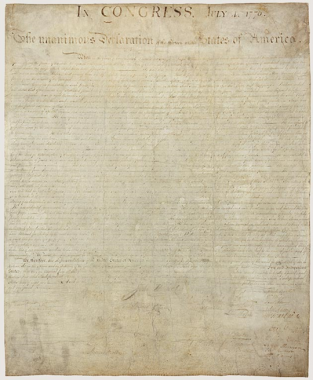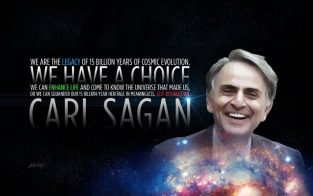Related Posts
Even today, one can be an optimist

Courtesy of the National Archives. According to the web page caption accompanying this image of the Declaration of Independence, “Years of public display before coming to the National Archives caused this treasured document to fade. Today it is maintained under the most exacting archival conditions possible.”
Tomorrow, we celebrate the birth of the United States. I assume that, as it has since 1922, the New York Times will publish the Declaration of Independence, and some will read it. We heard in the news today about the thousands who have died on the seas escaping Libya for Italy and other countries. People will continue to risk death for freedom.
Also today, a PBS NewsHour/NPR/Marist poll showed that Americans have little faith in some government institutions or their President. For example, 61% of Americans said they do not place much trust in the Trump administration, and only six percent of Americans say they have a great deal of trust in Congress. Seventy percent of Americans say civility has declined since the presidential transition. I’d agree with the 70%.
The poll shows that people are paying attention to what is happening, and that they are questioning the state of the country. Many are dissatisfied with the status quo. That means that things could change for the better. Of course, much damage could occur in the meantime.
A lot of people are waking up to the fact that the Affordable Care Act (ACA) is better than they thought it was. Many people could be on track to lose their health insurance – and some could lose their lives – depending on the outcome of Congressional action on repeal of the ACA. And changes at the Environmental Protection Agency (EPA) already are undoing years of proactive protection of the environment. There are plenty of reasons to be unhappy irrespective of one’s political party.
But there also are reasons to believe in a better future and to be optimistic about the future of the United States. After all, the creators of this country were visionary enough to write a document that declared: We hold these truths to be self-evident, that all men are created equal, that they are endowed by their Creator with certain unalienable Rights, that among these are Life, Liberty and the pursuit of Happiness. For its time, it was a bold, visionary and amazing statement that still holds today. Soon after, the Bill of Rights and Constitution spelled out the rights of individuals and government and became the basis of our system of government.
The play, Hamilton, which my husband and I were fortunate to have seen, reminded millions of people about the history of this country’s founding and broke records on Broadway for being the highest grossing play ever. Knowing our history can help us preserve what this country’s inventors set out to create.
Science can help us
One of my heroes, Carl Sagan, wrote The Demon-Haunted World: Science as a Candle in the Dark. He said, “The methods of science, with all its imperfections, can be used to improve social, political and economic systems, and this is, I think, true no matter what criterion of improvement is adopted.” (p. 376)
He quoted historian and political scientist Clinton Rossiter, who had written:
Science and its philosophical corollaries were perhaps the most important intellectual force shaping the destiny of eighteenth-century America . . . Franklin was only one of a number of forward-looking colonists who recognized the kinship of scientific method and democratic procedure. Free inquiry, free exchange of information, optimism, self-criticism, pragmatism, objectivity – all these ingredients of the coming republic were already active in the republic of science that flourished in the eighteenth century. (p.398)
In writing about the importance of science, Sagan observed that everything we do is an experiment. While not all randomized, still, we can learn from what we do to improve our world. He advocated strongly for questioning. He ended the book with a chapter titled “Real Patriots Ask Questions,” which began with this quote:
It is not the function of our government to keep the citizen from falling into error; it is the function of the citizen to keep the government from falling into error.
– US Supreme Court Justice Robert H. Jackson, 1950
So, as we celebrate this 4th of July, Independence Day, I will recall Jackson’s words. And I’ll think of my friend Enrique, who just became a citizen a couple weeks ago. He studied for and passed, with pride, the test that many of us could not pass. He is proud to be a gay, Hispanic American, created equal, endowed with unalienable rights, among them life, liberty and the pursuit of happiness. This is still a country of which I want to be a part, and I’m going to work even harder to make sure it stays that way.
Happy 4th of July!
Barbara

